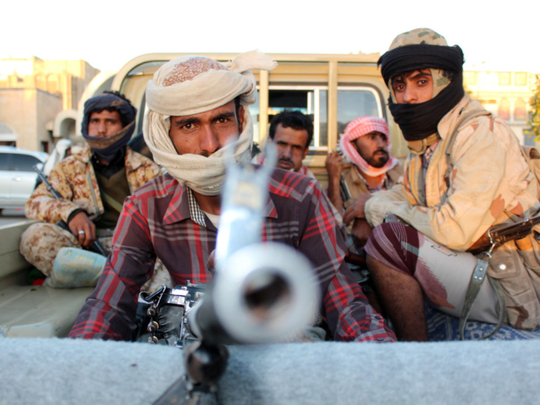
Al Mukalla: The current military operations across Yemen demonstrate that the internationally recognised government and the Arab coalition are determined to inflict defeat on Al Houthis and the forces of ousted president Ali Abdullah Saleh, political and military analysts said. The analysts predicted that the next year could herald the end of Al Houthis’ grip on power.
“I expect that 2016 will see the end of the current war in Yemen in favour of the legitimate [government], the south and the coalition,” Brigadier General Thabet Hussain, a retired army officer and a military analyst, told Gulf News.
Al Houthis militants, who sprang from the northern province of Sa’ada, have been at the centre of the political scene in Yemen since early this year, when they overthrew President Abd Rabbo Mansour Hadi and his government and replaced them with a presidential council. Simultaneously, the militants expanded their influence across the country with the help of many political, tribal and military figures loyal to Saleh. Hadi broke their siege of his house in February and fled to the southern province of Aden and sought the military help of Gulf states.
Thanks to a Saudi-led coalition that began bombing the militants in March, Hadi’s forces are in control of most of the country.
“The Saleh-Al Houthi alliance would have a few choices in the coming year; either offer major concessions or face complete defeat,” Hussain said. Months after heavy clashes with the militants, government forces with the helped of the coalition, mainly grounds forces from the UAE and Saudi Arabia, turned the table in July and seized control of the strategic port city of Aden. This landmark victory paved the way for the return of Hadi and his deputy Khalid Bahah.
Hussain said that the setbacks for Al Houthis in the northern provinces of Marib and Jawf are indications to the course of the military operations in the coming days. “The coalition apparently would stop at nothing to achieve all objectives of their military operation in Yemen. Despite making slow advance, the battles in Marib, Jawf and Taiz show that the coalition is winning the war,”
Government forces won another major victory in December when they pushed deep into the province of Sana’a getting closer to the heavily fortified capital for the first time since the beginning of fight against Al Houthis and Saleh’s forces. Hussain thinks that these military victories would contribute to the breakup of Al Houthis’ alliance with Saleh.
“Saleh, Al Houthis alliance would face serious economic, political and military challenges that would aggravate disputes between the two sides. Each party would blame the other for the failure.”
Politically, analysts predicted that the international community that collectively backed the government of the president in the last three years would keep pressuring the militants and the Saleh to abide by the UN Security Council resolution and pull out of the cities that they controlled after September, 2014.
“I am optimistic that the Al Houthis will be defeated. The international community must stand by the Arab coalition and president Hadi, which means continuing fighting until defeating the Al Houthis,” Taha Bafadhel, a political analyst from the province of Hadramout told Gulf News.
Bafadhel maintains the coming days could see a military revolt inside Sana’a or incursions inside Sa’ada province, Al Houthis’ stronghold.
“Many tribes [in the north] have switched sides and thrown their weight behind the coalition.”
Pessimism
To the disappointment of observers, Saleh said this week that he would boycott the talks and would go on fighting until the Saudis engage in direct talks with his party.
On the other hand, some analysts said that Yemenis would continue suffering from the aftermath of the current war that has left the country teetering on the edge of the abyss of famine.
“It [Yemen] sits on the brink of famine, with government control nearly nonexistent in the bulk of the country, while an array of divergent armed groups control the situation on the ground,” Adam Baron, a visiting fellow at the European Council on Foreign Relations and a former Yemen-based journalist told Gulf News.
Baron said that the dramatic events in the past year showed that it is hard to predict what the future holds for Yemen.
“It is hard to make even medium term prognostications. That being said, while a breakthrough is certainly not impossible — and while the newly restarted UN process does represent a potential path for the resolution of the conflict — its hard to be even mildly optimistic regarding how the coming year will unfold. The only thing that’s close to certain, it would seem, is that the people of Yemen — the innocent civilians caught in the crossfire — are likely to continue to suffer.”












